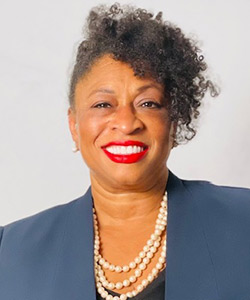By Traci Wade, Vice President, Global Head of Diversity and Inclusion, Oracle

It’s plain to anyone who’s visited the gleaming halls of Silicon Valley giants and their outposts across the world that the tech industry still lags in achieving gender equality. That really shouldn’t be surprising to any of us, as women for so long were discouraged from pursuing careers in fields like mathematics, engineering, and computer science. The gap has closed in recent years thanks to changing attitudes, but the enduring legacy of past preconceptions still exists, and a lack of visibility, mentorship, sponsorship, and inclusive culture still keeps a lot of women from pursuing their passion for technology.
This is what I’m keeping in mind as we celebrate Women’s History Month throughout March, and International Women’s Day on March 8, when we honor the contributions of women in our communities and our workplaces and pledge to do more to achieve equality across the world by “breaking the bias.”
But there’s a way forward; here at Oracle, I see it demonstrated every day. Achieving gender equality through hiring and career advancement demands proactive efforts to help women succeed.
I’m proud that Oracle is supportive of women in leadership positions. I’m not just talking about our wonderful CEO and other senior executives, but women at every level and in every role. Oracle stands out in this male-dominated industry by the level at which it empowers women and benefits from their talents. That includes the tech side of our business, which is where bias most often impedes the careers of promising women.
There’s no simple formula for this success. But there are some tangible measures that we’ve seen really drive progress.
One is to remove the stigma of career breaks. Because pregnancy, maternity, childcare, and even elder care more often impact women’s careers than men’s, women are more likely to take long professional leaves, then struggle with the challenge of re-entering a job market. That trend has been exacerbated over the last two years by the pandemic, and now the vast majority of re-entry candidates are women. We need to support them.
That’s the thinking behind our Oracle Women Relaunch Program designed to help reintegrate individuals into the workforce after a career break of a year or more. This isn’t the “returnship” that many companies offer, which are just internships that, at best, come with an opportunity for hire. This program brings candidates directly into full-time positions.
We’re aiming to implement this program around the world, as women outside the United States were often even more severely impacted by COVID-19. It was once considered risky to hire “relaunchers,” and companies put up obstacles that resulted in the loss of a vast pool of talent and experience. In recent years, however, we’ve seen many professionals re-enter the workforce after a career break—men and women—reinvigorated and refocused, with a clearer perspective regarding what they want to achieve and a stronger sense of professional purpose.
Another program I love, and one that can be widely emulated, is our Oracle Women Leadership (OWL), which has now been going strong for 15 years and is active in more than 100 communities around the world. OWL connects women with inspirational mentors and gives them the tools they need to grow into more specialized roles, including executive leadership. Through OWL, we’re developing, engaging, and empowering current and future generations of women to rise to the top echelon of Oracle leadership. Our Emerging Leaders and Women in Tech Summit serve as examples of how to engage, develop, and foster talent at Oracle. They also expand awareness of women in leadership roles, and of the importance of elevating more of them to leadership.
Programs like these explain why Oracle continues to be a leader in achieving gender-equality in the tech industry. But our initiatives can be implemented anywhere, within tech and outside it. What we’ve seen is that advancing the careers of women at Oracle creates a virtuous cycle, as they are the ones who are most likely to support those who come after them.
This past October, the G20 Women’s Empowerment Conference, the first ever G20 conference dedicated to empowering women, was held in Rome. Participants collected insights and data to identify the barriers holding women back in all walks of life—a project that culminated in a manifesto setting forth 10 guiding principles to promote women’s empowerment. Oracle signed that manifesto, reaffirming our commitment to fostering social and work environments that enable women to achieve their full potential and maximize their career success and fulfillment.
Among the guiding principles is Goal #2: the importance of collecting the right, unbiased data. Improving private and public data collection and reporting on gender equality is vital to measuring progress and then defining short-term and long-term targets.
Then there’s Goal #5: the paramount impact of education. This involves removing obstacles that impede equal access to education and lifelong training for women, and ramping up their participation in STEAM subjects. And also Goal #8: access to capital for women. That means funding programs and designing financial processes that give women preferential access to capital and create more opportunities for entrepreneurship.
We’ve been actively and eagerly advancing these three manifesto principles—quality data collection, opportunities for education, and access to capital—for years through programs like the Oracle Education Foundation and Oracle for Startups. A concerted commitment to taking action on them can lead to major advances in leveling the playing field and bringing more women into tech careers. I know, because I see it every day.

Traci Wade
As Oracle’s Vice President and Global Head of Diversity & Inclusion, Traci Wade leads programs that build awareness on the business impact and value of a diverse and inclusive culture at Oracle. She engages with senior leadership in creating and supporting strategies that infuse and elevate a culture of inclusion and equity.
During her career at Oracle, she has played a key role in establishing the company’s first diversity and inclusion team in 2009. Since then, Traci has become a strategic thought leader and subject matter expert on diversity and inclusion.
Traci has received recognition and awards for her commitment and success in leading Diversity & Inclusion corporate efforts, which include 2021 Profiles in Diversity Journal Women Worth Watching, 2017 Top Diversity and Inclusion Executives in Corporate America by Black Enterprise Magazine, Bridging the Gap Award by 2015 by San Francisco African-American Chamber of Commerce, Corporate Champion of the Year in 2012 by Black Data Processing Associates, Rising Star at the Women of Color STEM Conference in 2013 and Outstanding Corporate Contributor by Black Data Processing Associates in 2013.






